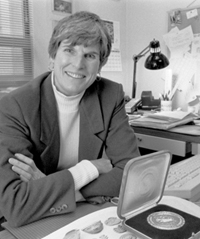Italy seeks return of artworks
Archaeology professor says MFA may have to deal

Boston’s Museum of Fine Arts should be prepared to part with more than two dozen artifacts if Italian authorities can prove they were stolen, says Clemency Coggins, a College of Arts and Sciences professor of archaeology, who has fought illicit trade in the antiquities market for more than three decades.
The artistic heritage division of Italy’s national police force announced two weeks ago that it was sending representatives to Boston later this month to try to persuade the MFA to return artifacts that it believes were unearthed during unauthorized digs. The announcement of the trip came the day after the Metropolitan Museum in New York struck a deal with the same police division to return 21 looted objects to Italy in exchange for long-term loans of artifacts from Italian museums. Among the items the Met has agreed to send back are the Euphronios Krater, a 2,500-year-old 12-gallon Greek vase, and the Morgantina Treasure, a third-century silver collection from Sicily.
Coggins believes that it would be wise for the MFA to work out a similar agreement if there is strong evidence that the relics in question were illegally removed from Italy.
“The MFA should certainly make some returns and negotiate some loans,” says Coggins, who received an award from the Archaeological Institute of America (AIA) in 1998 for her efforts to prevent the looting of archaeological artifacts.
The mission of the Italian authorities — who will be accompanied by U.S. Immigration and Customs Enforcement agents — is part of a broad crackdown by the Italian government on American museums that have acquired stolen artifacts. Prosecutors probing a smuggling operation in Rome contend that the J. Paul Getty Museum in Los Angeles knowingly accepted looted antiquities. Investigation of that case led authorities to a Swiss warehouse, where they seized photographs of what they believe are a plundered statue, vase, and jar now housed at the MFA. Prosecutors have compiled a list of 29 objects they say the MFA obtained illegally.
Coggins has long criticized the MFA’s acquisition policies; she has cited concerns about the museum’s collection of Maya jade, burial urns, and other pottery. She says that the items were likely stolen from ancient grave sites and that relics are being plundered at alarming rates around the world. “The looting of colonial art from Latin American countries is much worse than ever,” says Coggins.
She describes the antiquities market as “a major unregulated industry, where secrecy is taken for granted.” Although the Association of Art Museum Directors (AAMD) issued new guidelines last month on the acquisitions of archaeological artifacts and ancient artworks, the AIA, which is based at BU, recently issued a statement describing the document’s shortcomings. The association has proposed a new set of principles on museum acquisitions, including the establishment of a written policy for curatorial staff and stressing due diligence in verifying objects’ documentation.
Not every object of questionable provenance in U.S. museums is in jeopardy of being returned to its country of origin, Coggins points out. It wasn’t until 1983 that the United States passed a law prohibiting acquisitions of objects without proper export papers. And while the Met bought the Euphronios Krater in 1972 — more than a decade before the U.S. legislation — Coggins reminds us that the Italian police had irrefutable evidence that the vase was looted from a tomb north of Rome.
Coggins is well known for her efforts to see that major U.S. museums take a leadership role in toughening acquisition standards. “The critical thing is that museums be transparent,” she says. “We need full disclosure of all acquisition records, and even correspondence.”
The Italian authorities, who tout their deal with the Met as a model for other museums, have said that the MFA is just one of their targets. Should other Boston-area museums possessing objects with questionable documentation be concerned with this precedent-setting agreement?
“Yes,” says Coggins, “but the MFA is in the worst position.”